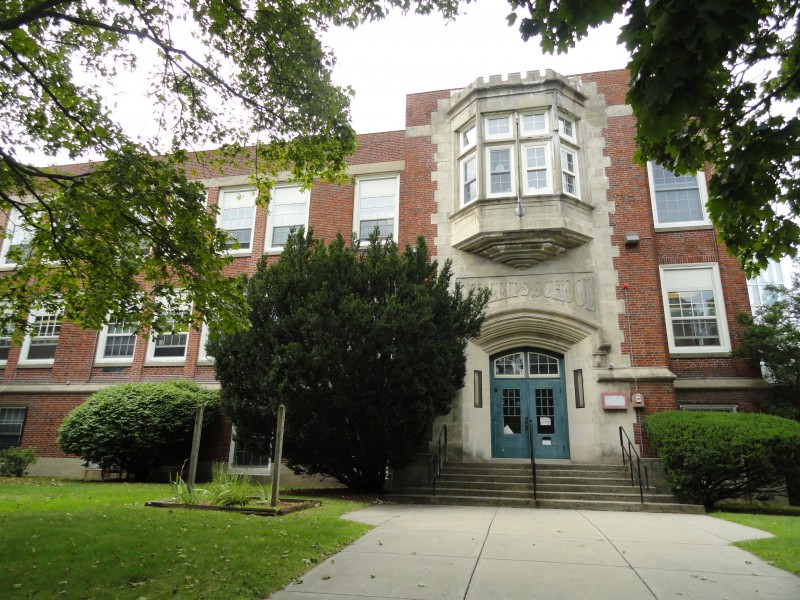
Charlie Breitrose
The Phillips School, home to the Watertown Public Schools administrative offices.
Tuesday night, the School Committee approved a policy for screening middle and high school students to see if they are using drugs or alcohol.
Known as SBIRT (Screening, Brief Intervention, Referral to Treatment), the screening will be required for all schools in Massachusetts, said Donna Ruseckas, Director of Wellness and Extended Services for the Watertown Public Schools. She told the School Committee about the screenings during a special School Committee meeting Monday night (see the slide presentation here).
The screenings will be verbal ones, and will be done in seventh and ninth grades, Ruseckas said. The purpose is to catch drug and alcohol use early, so that it does not become a further problem.
National data shows that 32 percent of people who started drinking at age 15 went on to become alcoholics, Ruseckas said, compared to just 9 percent of those who started at age 21.
The first time students reported drinking spikes in their late teens, according to the data, as does smoking tobacco or using marijuana.
During the confidential screenings, students will be asked 10 questions, related to drinking and drug use while in a car or driving, when they are used to relax, and when alone, Ruseckas said. They will also be asked if they become forgetful when using drugs or drinking, if family or friends have asked about their substance use or if they have gotten in trouble for doing so.
The questions are a part of a screening called CRAFFT (Car, Relax, Alone, Family Friends, Trouble). More information is available at www.crafft.org.
If a student answers yes to two or more questions, it may indicate a problem, and they will be referred for further assessment, Ruseckas said.
Parents and guardians will be notified before the screenings are done, and they can opt out of their child going through the screening, Ruseckas said. Students, too, can opt out.
School Committee member Eileen Hsu-Balzer, said she worried about students opting out.
“Students with substance abuse issues are the ones most likely to opt out,” Hsu-Balzer said.
School Committee member Candace Miller said that children use drug and alcohol for many reasons. Sometimes it is because they are having family problems, or are struggling with gender or sexual identification, and even because of sexual abuse.
“I hope we are making sure we are prepared to help students any way they need it,” Miller said.
The district will report the statistics results of the screenings to the state, Ruseckas said, but names won’t be shared.
The School Committee unanimously approved the policy at a meeting Tuesday night.
In regard to opting out, I actually stated that I wanted to be sure that students and parents understood it to be a genuine option with no negative connotations. Aid and support should be readily available to those who desire it, but no coercive program will be effective, and success will be based on trust and genuine confidentiality.
Thanks for the clarification, Eileen.
SBIRT is a critical part of the efforts to address substance use and misuse in our community. I fear that a headline like the one on this article will incite fear and suspicion among community members (because they will immediately jump to incorrect conclusions about the nature of the screening). I hope that in future articles and public awareness campaigns an effort can be made to ease concerns that parents and students might have (and so lessen the possibility of parents or students “opting out”.
Ilana Hardesty
Watertown
Program Operations Manager, SCOPE of Pain Program, Boston University School of Medicine
Please tell me that Candace Miller did not say that alcohol use can be a sign of other problems like sexual identification.
I’ll post my reply to Erica here as well as on the FB link:
Erica, I can assure you that I am quite horrified that my words could have been misinterpreted as you’ve suggested. I have to apologize that I had awful jetlag on Monday (traveled on Saturday after working a week in the Middle East). A full day of work and 2.5 hour SC meeting is tough. My words may have come out jumbled. I know what my point was, but don’t recall my exact words. My points were as follows:
1) I think screening for substance use could be a real game changer. For example, as someone who used alcohol as early as 7th grade, had I been screened in my early teens–and had appropriate follow-up–it could have saved me many bad decisions and experiences and poor grades.
2) We need to be well prepared to address our students’ needs when we begin screening. Right now, the plan is for health education, but we need more than education.
3) Our students (and adolescents in general) use alcohol and substances for many complex reasons. I’ve done statistical analysis for the Watertown Youth Risk Behavior Survey for a number of years and I know that students who report higher rates of alcohol and other substance use are more likely to identify as LGBTQ and transgender. Students that use are also more likely to report being sexually active, having experienced some type of sexual assault or rape, and have higher rates of depression and suicidal thoughts or plans. There was a recent article in the J of Public Health that showed students with higher rates of mobility (parents move) also have higher rates of alcohol use. Our students have complex lives and the reasons they use alcohol are complex. By the way, the pattern we see in Watertown is fully consistent with national data. For us here in Watertown, we must help students find a healthier path, which will likely require community, town, and school partnerships.
Charlie, do you think you can edit your article so my words are not misinterpreted?
Sure, I will reword it to try to make it more clear.
Thanks so much Charlie.